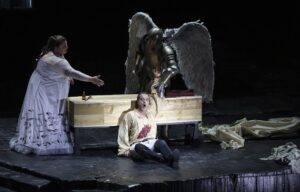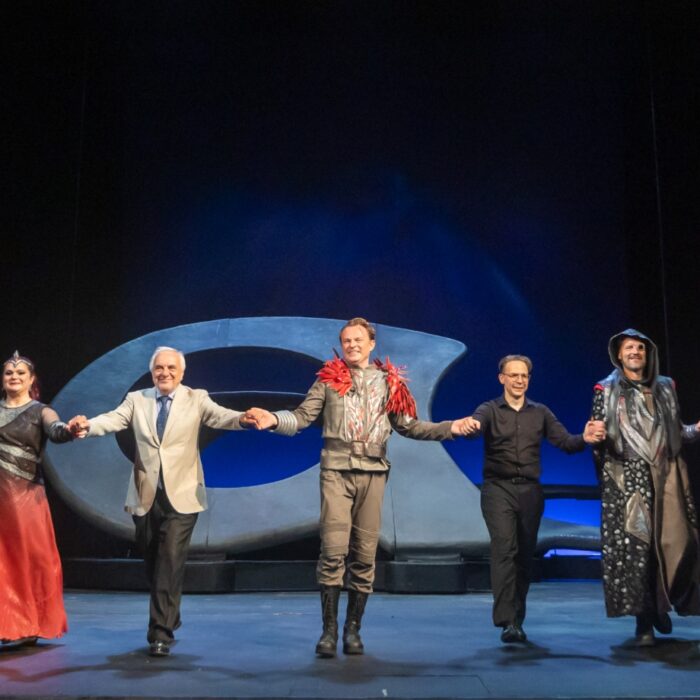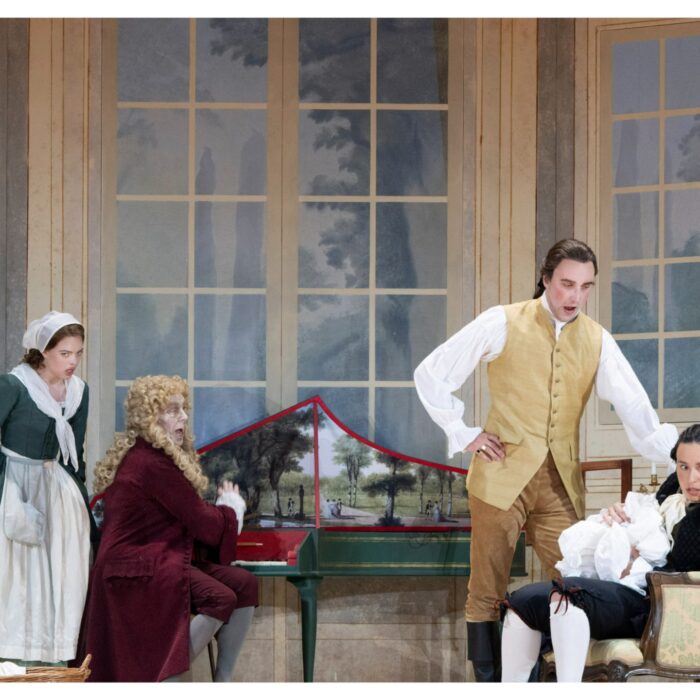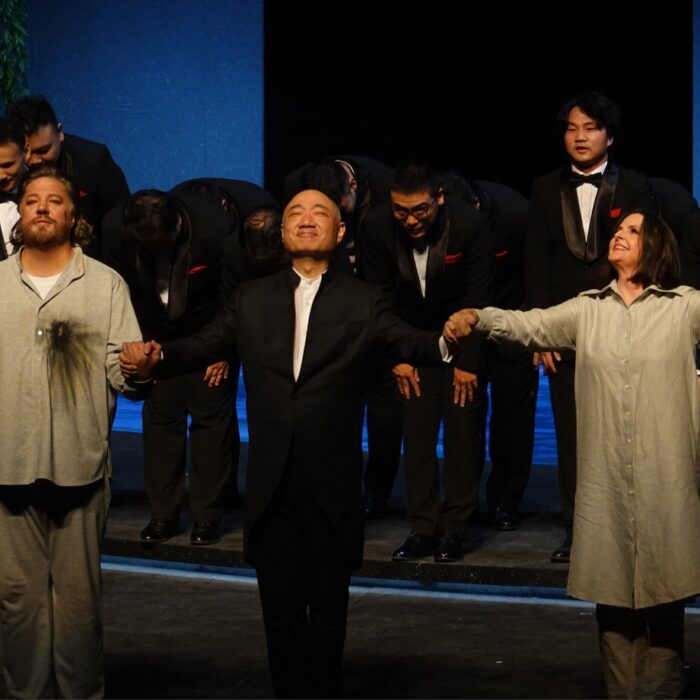
Palau de Les Arts Review 2022-23: Ernani
Angela Meade, Piero Pretti Shine in Modest Production
By Mauricio Villa(Photo Credit: Miguel Lorenzo/Mikel Ponce)
Valencia closed its 2022-23 season with Verdi’s “Ernani.” The success of their proposal relied on a strong cast, a non-provocative production, and the ardent labour of the young Italian conductor Michele Spotti in the pit.
The production, directed by Andrea Bernard, was a co-production with Teatro La Fenice in Venice. The stage simulated a landscape of rocky black formations, similar to slate rocks, with different levels. Spare sections of a castle, all in white were leveled out in several moments with arches, pillars, and walls. That was basically all. It was simple, yet attractive. There were just two pillars made of led lines that appeared in the second act and some of the castle sections turned around, so one could see how the sets were built. It was pretending, once more, to show theatre within theatre. However, this broke the unity and style of the set.
The stage directing was modest. The singers did not overreact or look like zombies lost walking around the stage in their arias. It was not bad, but it wasn’t brilliant either. The plot, emotions and intentions were clear. But somehow it lacked passion and extreme feelings. I am conscious that this is not one of the greatest librettos ever. However, it is based on the famous French writer Victor Hugo and therefore the staging could have had deep multiple layers of feelings and emotions, rather than being a bit flat. It was very interesting to see, a video projection during the overture that showcased the burial of Ernani’s father with an armored angel giving the child Ernani the horn that will prove essential to the opera’s plot This warrior with angel wings appeared in several moments throughout the performance.
Solid Casting
The Italian tenor Piero Pretti portrayed the title role of Ernani. His instrument became more lyrical with a darker timbre and subtle vibrato. He is known for his effortless and strong high register, and his singing sounds easy. Even though his voice is not big, it easily carries over the orchestra and has a certain squillo, especially on the A naturals. He gave an ardent interpretation of his opening aria and cabaletta, “Come rugiada al cespite…O tu che l’alma adora.” He expressed subtle yet beautiful variations on the repetition of the cabaletta.
In his role, he portrayed an arrogant and strong anti-hero who sang with determination especially during the trio and final concertante of Act one. He accomplished Verdi’s “sottovoce con terrore,” whispering with terror as he sang the line, “Ecco il pegno: nel momento in che Ernani vorrai spento.” Pretti created a tremendous contrast with the heroic music and attitude which predominates through this character.
Angela Meade sang the role of Elvira. When she sang, her opening lines of “Sorta è la notte” with a rotund strong dark sound, and with an astonishing chest voice register for the first low B flat on “ognor m’insegue,” her voice sounded like a true dramatic soprano. But when she bravely and easily sang the roulades of the aria rising, up to B flats and high Cs, her voice became lyrical, flexible and bright. She delivered an impossible pianissimo high C on the cadenza of the aria. Then again, the trills, the fast scales and the coloratura of the cabaletta were clean and precise. Her voice sounded like a true lirico-leggera. This incredible wide range, her sparkling easy high notes and immaculate coloratura made her perfect for this role. It is mostly written in the middle of the voice, but demands constant ascensions to high notes as well as strong low notes under the stave. It is incredible how she can sing the strong low chest voice register without compromising her top range. This is a quality which is rarely found.
Meade’s voice is a true gift of nature which enables her to sing the hardest roles ever written for soprano without compromising the beauty of her timbre or even the volume. Her voice projection is mesmerizing. Not only is her voice always present above the other soloists, chorus and orchestra, but it feels as if she were singing right by your side. The only problem was when she was singing high notes along with her colleagues at the end of scenes, like the high C which at the first act’s trio. I couldn’t tell if Pretti was singing the high note along with the soprano, or not. Her voice overpowered the tenor and the baritone, completely. Her B naturals and high C in the final first act concertante shined strongly and clearly over her colleagues, chorus and forte orchestra. It felt as if her voice was on a completely different level. And this role has at least a couple of high Cs in every scene and ensemble, which is a lot of high notes for a role that demands a strong low and centre register.
The Italian baritone Franco Vasallo sang the role of Don Carlo. His exquisite fiato and legato singing was shown in his opening scene, the first act duet with Elvira, “Quello ascolta del mio cor.” It demands expansive long lines navigating constantly around high F, even a high G. But this opera belongs to the early Verdi period when he was still influenced by the Bel-canto style. Verdi later found his own baritone “vocalitá” when the roles become more dramatic and strong. Vasallo sounded lyrical and expressive, with his dark velvety timbre and even vibrato. Navigating easily through the high tessitura effortlessly.
He was ardent in the subsequent trio and concertante, authoritarian and aggressive for his scene with Silva and the chorus in Act two, “lo vedremo…vieni meco sol di rose,” contrasting with melancholy and sadness. Vasallo expressed this by the clever use of dynamics and his vast palette of vocal colors. His interpretation of the third act aria, “Oh de’verd’annni miei,” was moving and tremendously emotional. He delivered a secure strong G natural in the cadenza of the aria. He went even higher by interpolating a strongly sustained high A flat in “delle tue gesta imitator,” in a section where only a harp and the strings in “pizzicato” are playing. The voice is completely exposed
The young Russian bass Evgeny Stavinsky sang the role of Silva, and it was probably his youth that made him not quite adequate for the role of an old nobleman. It is true that it is not a basso profondo role, which demands a strong low voice, but this role requires some certain vocal entity which Stavinsky’s voice lacked. He sang with perfect legato lines in his entrance aria, “Infelice! E tu credevi.” But his voice sounded small and distant. It did not represent the old nobleman. He seemed more adequate for Mozart or Bel-canto repertoire than this early Verdi piece. He is a good singer and musician, but I felt his voice needed a maturity that he did not have for this kind of role. Low voices are by nature stronger and louder than high voices. But in the second act trio, with Elvira and Ernani, the soprano and the tenor overpowered the voice of the bass completely, even when singing along Vasallo the baritone sound was more resonant than Stavinsky’s.
Big Contrasts
The young Italian conductor, Michele Spotti, made his debut in Les Arts and in Spain. He began the overture presenting the leitmotif, “the calling of the horn,” with tremendous pathos and dramatism. He conducted the expansive long Verdi melodies with lyricism and emotion. He managed to find a perfect balance between the orchestra volume and the voices, which created big explosive heroic moments without compromising the sound of the singers. He played with big contrast and created exciting memorable moments like the first act’s finale concertante.
He conducted “Allegro assai agitato” as marked on the score, the first section sang by Ernani and Elvira, “Io tuo fido?,” and then changed drastically to an enormous crescendo. He increased the tempo too, when Don Carlo, Silva, Jago and the chorus joined in. The brief introduction which opens the second act was fast, energetic and with an incredible fast tempo. After a strong fortissimo intervention of the choir on the line “giuramento,” in the “clemency scene” of Act three, he began the next section of the choir, “Si ridesti il leon di Castiglia” in “pianissimo” with slow tempo. He created a big crescendo ending in amazing strong climax in “fortissimo” at the end of the ensemble to close Act three. Spotti never repeated a section without presenting variations that matched the tempo, the dynamics or the emphasis of determined instruments.
He managed to keep constant tension and brightness in moments where early Verdi’s melodies sound too bombastic and predictable. It is probably his experience in the Bel-canto repertoire that enables him to create constant contrast and make Verdi’s early music sound exciting and emotive. It is true that some details of what Verdi would become, can be found in this score. But as I said before, he was still quite influenced by the bel canto style and therefore the orchestration and some melodies might seem too simple based on the voice which predominates.
The participation of the “cor de la Generalitat Valenciana” was astonishing. They sounded strong and had a determined emphasis to take special consideration of the male section of the choir, which plays an important role in this opera. The Orquestra de la Comunitat Valenciana sounded beautiful, with timbrical richness, full of harmonics and with perfect synchronization.
Ultimatley, this was a simple production, faithful to the libretto and the music with magnification interpretations by Angela Meade, Piero Pretti and Franco Vasallo in their respective roles. Adding to it all was the energetic baton of Michele Spotti.


